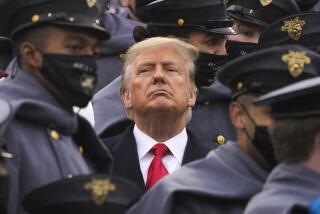In an Era of Only One Superpower, We’re All Safer
- Share via
Terrorists swarm into Iraq; North Korea plays nuclear blackmail; Syria and Iran hold hands in public; crowds fill Beirut’s streets; the shooting of an Italian journalist provokes outrage across Europe. Is this a world being made safe for democracy or a world on the brink? Some, especially Europeans, say the latter, arguing that this is what happens when the planet is stuck with just one superpower. Echoing France’s Jacques Chirac, they yearn for a more “multipolar world,” where an all-powerful United States can’t play the bully.
Nonsense. The fact is, a unipolar world is a safer world and has been historically. For more than 100 years, from the defeat of Napoleon to the start of World War I, Britain was the world’s lone superpower. Its Royal Navy enabled it to do the heavy lifting across the globe that no one else could or would, just as the U.S. military does today. Despite an inevitable crisis or two, the world enjoyed a century of unprecedented peace, prosperity and stability. Now, with so many worried about the U.S. dominating the world, it’s worth passing along the lessons Britain learned in its years as lone superpower.
Be prepared to make enemies. “How glorious is the title of ‘Englishman,’ ” wrote a Victorian-era Royal Navy officer after the mere presence of his ship off the coast of Italy ended riots in Rome and other cities, “and yet we are not loved.” Don’t expect to be. The world’s other powers will never be happy about the global order you impose. Very few will dare to challenge you overtly, but they will scheme behind your back.
For decades after Napoleon’s defeat, Britain fought to tug the world in a new, progressive direction against its former allies. Britain’s support of national self-determination in South America and southern Europe, for instance, often put it at odds with Spain and Russia. France, which Britain had saved from dismemberment at the Vienna peace congress in 1815, plotted to reverse Britain’s naval supremacy. Yet that supremacy protected France’s business interests around the world. It also preserved a balance of power in Europe, which allowed France to remain a great power until World War I. As Iraq shows, in power politics no good deed goes unpunished.
Be prepared for the long haul. Britain’s first step in creating a new world order in 1815 was declaring war on the Atlantic slave trade -- akin to today’s war on terror. It put together a coalition of the bribed and coerced just to get a final treaty (Spain and Portugal refused to sign unless they were paid off). Nations that still had slaves dragged their feet, especially the United States. For more than 40 years, the Royal Navy fought to plug the outflow of slaves from Africa amid daunting obstacles. Successive British governments persisted out of a sense of moral duty.
This arduous effort, which many dismissed as a failure for decades, finally paid off, and by 1870 one of the worst scourges of European domination of the planet had come to an end. In world leadership, persistence pays.
Your best ambassador is your military. For more than a century, the Royal Navy was not only the instrument of the Pax Britannica but its reassuring symbol. Wherever its ships anchored, travelers, merchants, diplomats and journalists of every nation felt safe. Royal Navy captains became the modern equivalent of knights in shining armor. Today, the men and women of the U.S. armed services fill the same role. Look at their essential role in providing relief to tsunami victims (just the kind of job the Royal Navy did for a century) in full view of the Muslim world. Isolated incidents like Abu Ghraib do not change the fact that U.S. troops make up the best military force in history. Let them be the face of the Pax Americana, in peacetime and in wartime
Finally, watch your back. Expect challengers to arise, those who will envy your power and look for opportunities to overtake you. Britain held on, partly because it never allowed its economic leadership to falter, but also because it committed itself to preserving a fleet at least as big as that of its two biggest rivals.
After World War I, British politicians tried to save money by slashing the size of the fleet. It was the crucial mistake of the 20th century. In the power vacuum Britain left in the Pacific, in slipped imperial Japan; in the Mediterranean, in slipped Mussolini’s Italy; in Western and Central Europe, Hitler’s Third Reich. It would take Pearl Harbor to awaken the giant that would eventually take Britain’s place as the world’s policeman, the United States.
The only thing worse than a world with a lone superpower is a world without a lone superpower. Despite its protestations, the world knows that -- and that in a real crisis, it’s the Americans, and only the Americans, who will save the day.
More to Read
Sign up for Essential California
The most important California stories and recommendations in your inbox every morning.
You may occasionally receive promotional content from the Los Angeles Times.










